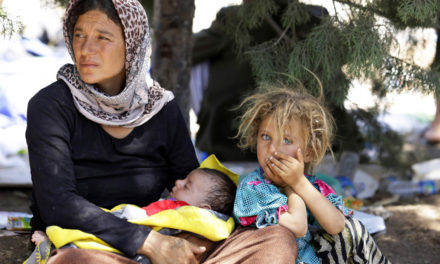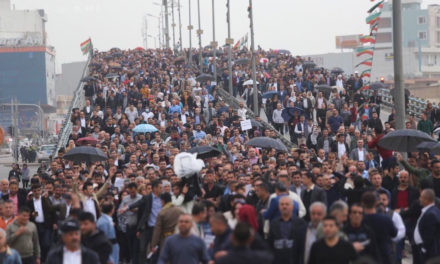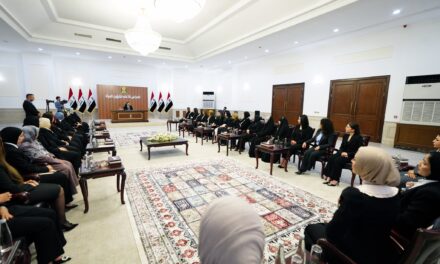(Photo: Iraqi News Agency)
The Faw Grand Port in southern Iraq will be the largest port in the Persian Gulf and one of the largest ports in the world. The port is being built by the South Korean company Daewoo on the Faw Peninsula, south of Basra, at a cost of about $5 billion. While work started in 2010, the project has been held up by political wrangling and mismanagement. Now the port is nearing completion of the first phase as it prepares to enter operation by 2028. It will change the map of global maritime transport because it will transport goods from Japan, China, and Southeast Asia to Europe via Iraq and vice versa, competing with the Suez Canal. When completed the port will be able to handle oil, gas, foodstuffs, chemicals, and every other global trade product which will cut the time needed to transport between Europe and Asia by 11 days.
The Faw Grand Port is expected to have 99 berths, handling 7.5 million twenty-foot equivalent units (TEU) annually and will be the largest port in West Asia, surpassing the Jebel Ali Port in the United Arab Emirates, which has 67 container berths. The project has strategic importance for Iraq and is expected to have significant financial returns by transporting and delivering goods and oil faster than ever before, as well as rejuvenating the transportation sector. The port will be connected to a railway linking the Gulf region through Iraqi territory to northern Europe via Turkey, which gives Iraq a new position in global trade. It will also link the Gulf countries which are considered major consumers of foreign goods with Turkey, which is a major consumer of oil and at the same time a main exporter of goods.
Because Iraq has only a small shoreline, the Faw Grand Port is being constructed on an artificial island in the Iraqi waters of the Gulf, which will contain a city with an area of 350 square kilometers of which about 250 square kilometers are inside the sea. This island will be built by burying one billion cubic meters in the sea with 25 million tons of stone. It will include the port, commercial and industrial areas, as well other developments. Costs for this island could reach up to $12 billion but revenues could recoup these costs within 6 years.
There are some technical hurdles to overcome, including sizeable areas where water depth is no more than 40 meters, the shallow mud barrier near Al-Faw where depth is only 3-6 meters and the proximity to Iranian and Kuwaiti territorial waters which will make ship navigation to the port challenging. Yet, the Iraqi government is confident it has built enough momentum with the project and expects to be fully completed and at maximum capacity by 2038.
The project has faced several obstacles since work began which has led some observers to question whether the port will ever be built. Iraq’s financial crisis from 2014-2018 caused by low oil prices and the war against ISIS meant the port project suffered from lack of funding. Political disputes between Baghdad and Iraqi Kurdistan have held up the prospect of connecting Faw Grand Port to an economic corridor that links gas and oil fields throughout Iraq to Turkey. The Iraq-Turkey Development Road or the so called ‘Dry Canal’ is designed to place Iraq in a strategic position for global trade and begins with the Faw Grand Port. However, it provides competition to other economic corridors such as those in Iran, Saudi Arabia, and even in Pakistan where China’s Belt and Road Initiative has opened new trade and transport hubs.
Iran and Kuwait in particular are concerned about the effect the Faw Grand Port will have on their own ports and trade traffic. Iraqi politicians have been embroiled in scandals and diplomatic controversies with their Kuwaiti counterparts over the Khor Abdullah waterway and the Faw Grand Port it leads to. Kuwait is building the nearby Mubarak Port which is a direct competitor and will make the narrow shipping lanes into Kuwait, Iraq, and Iran even more congested. There may be hope for cooperation between the 3 countries so that their ports, railways, and highways are connected and complement each other for mutual economic benefits rather than as damaging competition. However the language and actions in reaction to Faw Grand Port has been hostile and could pose a threat to its viability if Kuwait and Iran escalate their opposition.
What the Iraqi government must focus on now is completing the first phase of the Faw Grand Port as quickly as possible and begin its operation. This will be the acid test for Iraq’s economic ambitions and if it is successful then the other pieces in the plan to reduce reliance on oil exports, such as the Iraq-Turkey Development Road, will also become more realistic. There is a need to engage in more diplomacy with Iraq’s neighbours, particularly Kuwait and Iran, but also Saudi Arabia, Jordan and Syria, to seek a way to share economic benefits by connecting infrastructure and encouraging more trade. The Faw Grand port can potentially be the start of Iraq’s economic rebirth, but it will require better management than has been seen so far by successive Iraqi governments.
This essay is part of a special series – Empowering Change in Iraq: Policy Recommendations for a New Era











